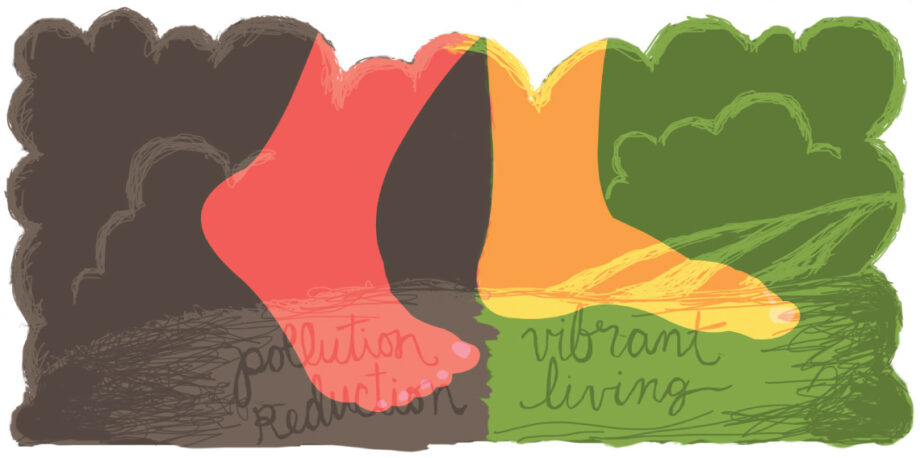March 12, 2013 — Sustainability is dead. Or at least the entire language we use to talk about it should be buried.
Fashion icon and eco-advocate Alexa Chung sums up the problem nicely in British Vogue: “‘Ethical Fashion’: surely the least sexy words in fashion. Sustainable, ecological, organic … the language of conscience-free shopping is a clunky vocabulary that instantly brings to mind images of hemp kaftans, recycled tin-can bags, and other things I’d rather not swathe my body in, thanks.”
In an effort to shape more sustainable consumerism in China, my nonprofit JUCCCE looks at aspirations of the enormous middle class — more than 450 million today, growing to 800 million by 2025, according to Helen Wang, author of The Chinese Dream. Let’s face it, the ladies who lunch and meet over mani-pedis are not likely to be swayed by words such as “circular economy,” “green” or “collaborative consumption.”
Sustainability messaging must shift hard from a focus on abstract responsibility to one that helps people make subconscious choices that make them feel good about themselves. We need to speak to the heart, not to the head.
The key issue at stake is scale. We need to remake the lexicon of sustainability if we are to move beyond preaching to the choir and gain serious mind share of the less interested masses.
At the World Economic Forum in Davos in January 2013, choice expert Sheena Iyengar led a group focused on sustainable choices through a thought exercise. She asked, “What was the last product you bought that you felt guilty about, why did you feel guilty about it, and why did you buy it?” Then she asked the same about “the last product you bought that you loved.” In both cases people said they bought things because they made them feel special.
Iyengar argues that people are motivated more by love than by guilt. If we love to do something, we will still do it even if we know it’s bad. Sustainability messaging must shift hard from a focus on abstract responsibility to one that helps people make subconscious choices that make them feel good about themselves. We need to speak to the heart, not to the head.
Language matters. So why is the sustainability community still stuck on the images of reduction?
Julian Borra, the former global creative director of Saatchi S, calls this the “irresistibility factor.” Actress Joanna Lumley, ambassador for Marks & Spencer’s Shwopping program, simply says, “Just make it gorgeous, dahling.”
Language matters. So why is the sustainability community still stuck on the images of reduction such as “zero,” “low carbon,” “energy efficiency” or “350”? Isn’t it time we started using a more emotional vernacular, like “sexy,” “unique” and “comfy”?
How do we talk in a way that shapes the aspirations of people, so that those aspirations are implicitly sustainable? As Jonah Sachs urges in his book Winning the Story Wars, an entire new myth must be crafted and told in a way that moves the masses away from the story that says, “Good citizens are consumers who drive the economy and drive social progress.” This, he explains, was a specific story the U.S. government called on marketers to develop in the post-Second World War years when America was faced with an economic crisis. “Consumption became the highest expression of individual liberty and national pride,” Sachs writes. Today he calls on us to remake our dreams.
JUCCCE is doing just that with the co-creation of a new China Dream called the “Harmonious Happy Dream.” A UK Dream spinoff, led by Best Foot Forward, launched this month in London with a workshop on redefining the language of sustainability. This paired effort is significant because it calls for reimagining prosperity and social norms in both a developing and a developed nation.
In the China Dream vision of a better quality of life, each focus area is phrased as an aspiration but drives sustainable behavior. “Transit-oriented design” becomes “convenient, metro-centered living.” “Trigenerational developments” becomes “vibrant living.” “Pollution reduction” becomes “safe food and water.” Sterile academic wording is replaced with personal benefits. In fact, the word “sustainability” is entirely replaced with the phrase “和悦 [harmonious happy].”
Fear and shame — the opposite of love — are also deeply personal emotions that can affect behavior, particularly in certain cultures such as China’s. In the U.S., Republican pollster Frank Luntz brilliantly shifted the term “estate tax” to the more emotional “death tax,” which killed any chance for success because the issue became synonymous with the fear of dying. Luntz’s motto is, “It’s not what you say, it’s what they hear.” In this case, people heard “vote for my death.”But while fear might scare people away from one choice, it may not necessarily persuade them to go toward another. In climate change, unlike voting, it’s hard to show people what action they might immediately take to make a difference.
Policy wonks, scientists and academics in the narrowly contained sustainability community are not naturally wired to use a language of emotion. They are fearful of not being taken seriously. Parties like JUCCCE and Best Foot Forward can help broaden conversations around sustainability by building connections between these experts and people in other fields, including advertising, movie production, marketing, behavioral psychology and religion. Such storytellers can be instrumental in lending a personality to the sustainability movement.
Let me show you what I mean. The following are some examples of people who should be engaged in sustainability efforts to push the movement forward.
Investor Jeremy Grantham of GMO stands out because he can passionately and articulately talk about the long-term future of the Earth through an economic lens that helps fellow investors see impacts in dollar signs.
Jim Wallis, CEO of Sojourners and chair of the Global Agenda Council on Faith for the World Economic Forum, recently received a grant to pursue climate advocacy through faith communities. Stewardship of God’s creations in the Bible is a direct link to calls for environmental volunteerism.
Suzanne Shelton, an American pollster and behavior change specialist, talks about how humor may be more effective than education at breaking habits. She says, “Knowing a thing doesn’t mean you will do a thing.” Perhaps the biting wit of TV comedians Bill Maher and Stephen Colbert could be used to make fun of shameful unsustainable behavior.
The make-up-words-and-mix-them-into-mantras master of this generation, will.i.am, can surely put a light and hip twist on sustainable behaviors.
Lastly, could we convert media king Ryan Seacrest, who has subverted the image of success in the American Dream into an orgy of conspicuous consumption with shows like Keeping Up With the Kardashians, into a sustainability advocate? If so, could he bring bling into sustainability?
In pointing out what makes a successful movie, Phillip Muhl, a major movie executive formerly of Disney, says that no one wants to watch a movie where the world is going to end and we’re all going to die. But we all love a good drama that shows us how screwed we can be, and yet the human race still perseveres. We go to movies for hope. How can environmentalists move from climate-weary white papers to magnetic box office–style stories?
The team behind the new Battlestar Galactica was brilliant in the way it allowed glimmers of hope in the midst of so much despair. Similarly, the human drama of everyday life on an Earth being stripped of resources must be told in a compelling way. Instead of the drama of polar bears or rising PM2.5 statistics, we must tell the story of us.
It’s time to start questioning not just what world we will leave behind, but what dreams we will shape for our children. To do that, we need to leave sustainability jargon behind and take up the language of hope. ![]()
Editor’s note: The views expressed here are those of the author and not necessarily of Ensia. We present them to further discussion around important topics. We encourage you to respond with a comment below, following our commenting guidelines, which can be found here. In addition, you might consider submitting a Voices piece of your own. See Ensia’s “Contact” page for submission guidelines.
Ensia shares solutions-focused stories free of charge through our online magazine and partner media. That means audiences around the world have ready access to stories that can — and do — help them shape a better future. If you value our work, please show your support today.
Yes, I'll support Ensia!



To get involved in the new UK Dream effort, please see www.ukdream.org.
To get involved in building the new UK Dream effort, please see www.ukdream.org.
We do know exactly how to solve the climate change problem and it doesn't even involve too much in the way of sack cloth and ashes. James Hansen laid it out in his "Target CO2" paper some time back. 1) stop coal use (easy), 2) slash non-co2 forcings (harder), 3) rollback 200 years of deforestation (dependent on 2).
The French have been generating electricity for 80 gm-co2/kwh for over 20 years. Nuclear power can do that. Fast reactors can use waste for fuel. We don't even need uranium mines. We can produce hydrogen, desalinate, etc. Couple that with dietary change to enable a roll back of 200 years of deforestation and most of the problem is solved. So we have one big behaviour change (plant based diets) and one big policy shift (nuclear power) and we are done. Standing in the way of plant based diets is a vast animal industry who kill for a living, so they have no qualms about doing what it takes to keep their power, and standing in the way of nuclear power is a vast population scared witless by decades of radiophobic misinformation. This includes plenty of "green" groups who are more frightened of stuff like radiation which does very little than climate change ... e.g., 350.org, WWF, Greenpeace, etc,
JUCCCE's team is in SH and BJ although we do have activities in Guangzhou once in a while. Feel free to connect with our project manager CharlieMathews@juccce.org in Shanghai.
You might be interested in behavior change expertise at The Shannon Group in Melbourne, as well as the Behavior Works group at Monash U. They have been very helpful to China Dream.
www.theshannoncompany.com.au/
www.behaviourworksaustralia.org/
of this. I've looked around the JUCCCE website and can't find anything at all related to dietary change. Did I miss it? Please email me, we may have more to discuss than can fit in comment boxes! And I have contacts which may be able to assist.
Since then I experienced this task as the very walk on the edge and we will have a long way to go. But it is worth the effort to break up the crust of this dry earnestness I encounter quite often in the sustainable business community and transform it into wholeheartedness that allows the same aspired quality and focus but with an warm smile at every moment, despite all the hurdles we face.
Let's make it sexy, hearty and marvelous and all our efforts will make many people really crazy about our products and services.
I've posted a part of the proposal on our website- just per your request. www.juccce.org/eating.
Add me on Facebook or on Twitter @shanghaipeggy so we can message.
Yes indeed its time we move out of the technical scale talks and reach into the hearts of the consumers which will drive things faster and more efficiently. A new outlook as suggested by Sheena as well is well agreeable. We the young can definitely lead the lexicons to evolve for the times.
Making the consumer aware of the positive impact of the decisions and choices the make are key in the change .
Sustainability though in my view will never be dead but thrive as a platform and fertile field of the stories of tomorrow where new elements and views are born more vibrant, robust and stylish.
To us M&S and other mass consumer and disposal organizations as an example of how things should be done is proof of the corruption in this article - carry on as normal but dress it up in a way that sounds good and we will get away with it is a bad argument. M&S started its re-use campaign not for any reasons of altruism but so that it could market second hand clothing after the Depression of 2007 started to hit its bottom line.
Cynical manipulation of the feeble minded is not the solution. Sustainability is not dead, the mass consumer society that has brought sustainability on to the front pages of every major news outlet in the world is the problem and the multinationals driving the argument for re-branding should be banned from masquerading as anything but damaging to the environment.
regards
A great article which recognizes the power of story in accomplishing change for good. There are plenty of examples of people, movements, and governments who have used story for "bad." This does not mean we should ban story from the toolbox!
Two VERY different things...
Peggy is absolutely right that new messages need to be crafted to sell things through the values that have inspired people throughout history: love, connection, health, sex, wealth, convenience, growth, desire, power and emancipation. Not guilt, fear, morality or mainstream pressure.
I am reminded of an Esso Oil commercial that was played on TV in Canada in the late 1980's that stated that the sustainable choice was oil, and pictured a modern freeway with a horse drawn buggy as the alternative. Though a reality in many parts of the world, this was a scene that was truly weird for the consumer culture in the throws of the Reagan inspired boom in North America.
If we can get people to be as excited about clean tech as they were when they saw their first airplane, with that sense of "Oooh!" and "Aha!" we will be much further along the sustainable path.
I spent 2-1/2 years living in Japan. "Your Happy Healthy Electric Life" was the slogan of an ad by Tepco (Tokyo Electric Power Company) in the early 1990's. Forgive this gaigin (foreigner) for being a tad cynical about an ad that pushed increased energy use, in a country with very little sustainable energy production. So some of the reluctance to embrace this kind of rebranding is caused by a different perception of the meaning and importance of particular language. What was very significant was the change of the official Japanese characters for garbage that occurred just as I left in '93, from a literal translation of "trash" to "recycling resource." This is not a small change, however small it may seem to people of non-Asian cultures.
However, the main point of changing the story, and then changing the dialogue, is critical. We just need to ensure that people really understand the urgent need to deal with climate change and its results. There is no sugar coating the seriousness of the situation. There is no getting around the need to radically reduce unsustainable energy production and use. We cannot simply rebrand consumerism and hope that all will be well.
And we cannot underestimate the ability of people to act with great determination and forbearance when the challenge ahead is clear. This ability crosses cultures and stories. The determination of the people of China inspired by Mao in throwing off the yokes of foreign control and imperial corruption. The determination of the people of America after Pearl Harbour, of Canadians at Vimy Ridge. The forbearance of the people of Japan in sticking to a pacifist path after the disaster of the Second World War. The bravery of those who are involved in the front lines of the sustainability movement today.
These are small examples, and many interpretations of history are possible. But if the challenge is clear and present in in front of us, then we can act. Reality is not avoidable in history. We must face up to the reality of Earth as soon as humanly possible.
We just might not be able to wrap this up in something gorgeous, dahling...
I agree that there is a little bit to much "dooms-day" vocabulary used in the debate today. However it is a very serious situation so we definitely need a lot of "Both", since I think different people are susceptible to different "approaches".
But still sustainable initiative should have a far more positive "reporting" than just a "dull" description of the facts, especially the ones that are truly Positive.
http://sorenandersson.com/less-unsustainable-is-not-equal-to-more-sustainable/
And for more information on the methodology we are taking (both soft power carrots- aspirations, and stick- policies) please see www.juccce.org/chinadream.